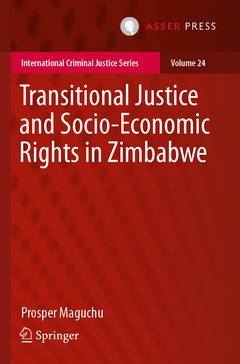Description
Transitional Justice and Socio-Economic Rights in Zimbabwe, 1st ed. 2019
International Criminal Justice Series, Vol. 24
Author: Maguchu Prosper
Language: English
Subject for Transitional Justice and Socio-Economic Rights in Zimbabwe:
Approximative price 105.49 €
In Print (Delivery period: 15 days).
Add to cartPublication date: 08-2020
Support: Print on demand
Approximative price 105.49 €
In Print (Delivery period: 15 days).
Add to cartPublication date: 08-2019
175 p. · 15.5x23.5 cm · Hardback
Description
/li>Contents
/li>Comment
/li>
Chapter 1. The Linkages between Corruption and Transitional Justice.- Chapter 2. Understanding Corruption and Human Rights.- Chapter 3. The Phenomenon of Corruption and Socioeconomic Rights in Zimbabwe.- Chapter 4. Revisiting Methods of Addressing Past Corruption and Human Rights Violations in Zimbabwe.- Chapter 5. Rethinking Ways of Dealing with Corruption under Transitional Justice in Zimbabwe.- Chapter 6. Zimbabwe in a Comparative Perspective.- Chapter 7. Conclusion.
Contains international legal terminology in understandable language
Contrary to many books on transitional justice in Zimbabwe, this is the first to deal with corruption
One of the few books to address socio-economic and/or human rights issues in Zimbabwe after the November 2017 military intervention

